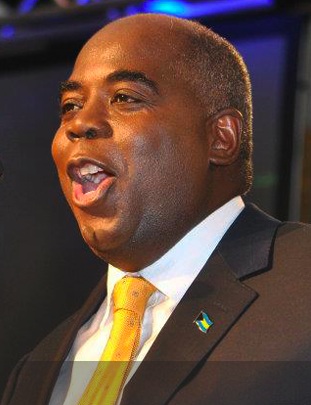
Presentation by
The Honourable Philip Davis, M.P., Acting Prime Minister
On the occasion of the Opening Dinner of the BFSB International Business and Finance Summit
Georgetown, Exuma
23rd January, 2014
Introduction
Ladies and Gentlemen,
It is a pleasure for me to address you tonight, at this 13th Bahamas International Business and Finance Summit in lovely Georgetown, Exuma. I welcome you all to the island of Exuma, an island which serves as an example of a successful model of small island development that my Government is working to see replicated throughout these family of islands. Exuma has seen a re-population from its diaspora and other Bahamians to take advantage of the economic opportunities throughout this island. We are proud of the calibre of the investors which we have attracted to Exuma and we hope that their real estate investments will, if they have not already done so, translate into financial services and other commercial business in the near future. This cross fertilization of efforts between real property investment and business investment in targeted sectors as outlined by the National Investment Policy must be encouraged and will ultimately be an important component of the development strategy of The Bahamas. We want to see more influential persons come to The Bahamas as second home buyers and end up as business investors and employment generators and ultimately agents of economic mobility for Bahamians. More importantly, we want to see more Bahamians taking advantage of the economic opportunities which exist in this new paradigm, so that there is increased dynamism and balance in The Bahamian economy.
The topic of your Summit this year is quite appropriately “Survival of the Fittest”. In thinking about this topic, I wish to impart that survival, and ultimately growth of our financial services sector, in this current environment, is dependent on a combination of factors: These include smart government policy and the joint commitment, trust and partnership between government and industry.
The Evolution of Financial Services in The Bahamas: A Fit Survivor
Ladies and Gentlemen,
Eighty plus years of financial services history is remarkable. When I think of the humble beginnings of this proud little nation and how we have survived the ups and downs of financial services transformation and changes over time, I say to myself that our history and our resilience are truly remarkable.
Despite the organic origins of the financial services industry in The Bahamas, beginning in the late 1960s, successive governments of The Bahamas sought to ensure that its development was more strategic, building on the comparative and competitive advantages that we, as a nation, possessed. As changes in the global landscape occurred, keen practitioners, aided by the necessary Government legislative and policy updates, were able to ensure that The Bahamas was able to meet the legitimate needs, whatever they may be, of clients. And so we saw the introduction of the Banking Act of 1965, and subsequent other legislation to formalize and modernize this industry in 1970s, 1980s and up until today. We can stand proud as one of the first countries to regulate trust business – a niche area that we carved out as uniquely ours in the financial services world.
Today, financial services are an important economic engine for the Bahamian middle class, which also has a multiplier and trickle down impact on other Bahamian businesses and employees. I could quote the figures: 7000 direct and indirect jobs, 15% or so percent of the economy; but those numbers do not reflect the true value of what the financial services sector means to The Bahamas. To my Government, it means that outside of the likes of the legal, medical, engineering/architectural and other professions, commercial interests and other vocations in The Bahamas, Bahamians were able and continue to apply their hard won education, and receive competitive compensation from the financial services industry, which moved them into a vibrant middle and upper middle class. We saw Bahamians rising through the ranks within firms, and some being transferred to foreign countries for further training and experiences and taking up leadership roles upon their return home. This is the story which we will continue to proudly tell and why my Government carefully advances and guards financial services so vigorously.
Challenges Come and Go: Survivors Stay
Ladies and Gentlemen,
There is a saying, “When the going gets rough: the tough get going!” and I have thought about this in the context of financial services. For Financial Services, I interpret that to mean that during these times of tremendous challenge, if we are truly to be survivors, then we must redouble our efforts; go even faster, even further to seek out new opportunities and to lay the ground work for those better times which, I am confident, are ahead. Entrench yourselves even further into The Bahamas. Your commitment will not be forgotten. Challenges come and go, but survivors stay and become even more committed to success.
Yes, The Bahamas is a mature financial centre, and like others, we have been challenged by many issues. Some imposed on us from abroad; and here, I speak of the many initiatives with which the Ministry of Financial Services and the Ministry of Finance are grappling. We have FATCA, AIFMD, FSAP, OECD, G20, G8 (an alphabet soup of initiatives which have imposed greater scrutiny on the financial services industry). There are still challenges associated with the current global economic downturn. And of course, there are domestic challenges which we must deal with sensibly and sensitively.
Survival of the Smartest
Yet, the Bahamas’ financial services industry, continues to succeed. We do this in large part because our industry players are survivors, and “get tough when the going gets rough”.
But I want to emphasize that another component of our survival rests with smart government policy. So, in this current period when the global financial architecture is under review, The Bahamas recognises that in order for its financial services sector to survive and to continue to lead in the foreseeable future, two things are needed. First, prospective global challenges must be fully understood; and second, a progressive policy framework must continue to be refined to ensure that The Bahamas is able to adapt to the rapid transformative pace of the current environment.
I therefore want to take the majority of my presentation then to discuss how smart domestic policy will ensure our survival and growth.
Smart Policy for Growth: Human Resource Development
According to the experts, where firms locate are a result of a complex interplay of factors; including (i) geographic proximity to clients and important markets, (ii) how easy it is to do business in a country and most importantly (iii) the availability of skilled local talent, and the efficient facilitation of international investors and required non Bahamian personnel. Other sets of factors such as the culture and diversity of a place; its infrastructure and quality of life, of course, impact business location. Indeed, practitioners, investors and potential investors in The Bahamas have said the very same things to me. So, these are known factors.
And so Ladies and Gentlemen, one of the themes that I wish to leave you with this evening – is the need for Smart Human Development Policy in The Bahamas. Countries in this hemisphere (and I am talking about both the Caribbean and Latin America) must address this phenomenon known as the ‘skills gap’ because these gaps directly constrain what we can do generally and how we compete for mobile capital.
My Government is not prepared to sit idly by with respect to addressing any real or perceived skills-gaps in The Bahamas. Therefore, we will work with all relevant institutions within the Bahamian Government and outside of the Government to ensure that Bahamians are ready for the changing realities in the financial services sector. I take this opportunity today to also implore Bahamian practitioners to take it upon themselves to meet the challenges of today and tomorrow.
The Ministry of Financial Services, in concert with various public and private sector institutions, I am pleased to say, is fully focussed in this area. The Bahamas is closer than ever to establishing itself as the Centre of Excellence for the Region in Financial Services Training and Research. Minister Pinder has been directed to make achieving this distinction a priority for his Ministry. Towards this end timely initiatives have been taken in advancing financial services internships, industry training and development, and new courses in Taxation and Corporate Finance.
Smart Policy: Public Diplomacy and Increased Dialogue
A second component of The Bahamas’ survival and growth strategy for the financial services sector is public diplomacy and increased dialogue. The Bahamas Government, led by the Ministry of Financial Services, supported by all other relevant Government agencies have undertaken to champion our financial services industry. The Government of The Bahamas will respond systematically, through all channels available to us, to counter misperceptions about The Bahamas and its financial services industry. We are seeking to ensure that international organisations such as the Organisation for Economic Cooperation and Development (OECD), the International Monetary Fund (IMF) and the Financial Action Task Force (FATF), continue to acknowledge that The Bahamas is a well-regulated jurisdiction and one which is known for its compliance with international best practices. In fact, arguably, the anti-money laundering, anti-terrorism funding, and regulatory regimes of The Bahamas are more robust and far more effective than the corresponding regimes of those countries who are leading the fight against our jurisdiction.
For example, in April of last year, The Bahamas, concerned about the reach of the United States Foreign Accounts Tax Compliance Act (FATCA) hosted the first and only regional FATCA workshop facilitated by the United States Department of Treasury and the Internal Revenue Service. At the close of this workshop, during which 10 Caribbean jurisdictions had the opportunity to hold bilateral discussions with US Treasury Department and IRS officials, The Bahamas was able to secure certain exemptions for trusts, private trusts companies and funds. This is the power of dialogue, the power of diplomacy.
The Bahamas will tell the entire world that its financial services industry is a legitimate, development model and one which had made a substantial contribution to the gross domestic product, the economic prospects and long-term development of The Bahamas.
Human Resource Policy
I would like to assure you, the leaders of the Bahamian financial services industry, that my Government will implement the right balance with respect to the maximum use of Bahamian expertise with the best possible career path for upward mobility. At the same time Government will ensure that suitable arrangements are put in place in keeping with internationally accepted practices to facilitate international investors doing business in The Bahamas, and to facilitate the non-Bahamian expertise needed to grow our financial services sector. The Minister of Financial Services, the Ministers responsible for Labour, Training and Immigration and key industry stakeholders, will undertake a comprehensive review of the current policies and practices which impact financial services. Our objective overall is to facilitate the ease of doing business in The Bahamas, and to support our international trade commitments in a manner which would be of maximum benefit to the Bahamian economy.
Conclusion
On 10 July 1973, The Bahamas stood on the cusp of independence with many uncertainties about its future. Forty years later, The Bahamas is characterised by a stable democracy and a stable economy built on two major pillars: tourism and financial services. Economic development for The Bahamas has not been easy. We were limited in natural resources and local capital. Rather it has been achieved through hard work and determination and the ingenuity of our people working with stable governance. It is with this same determination that The Bahamas commits itself to maintaining its position as a global leader in the financial services industry. It cannot be overstated of the importance of the financial services sector to provide not only jobs, but true career development opportunities for our citizens.
Our challenge, like all other centres, is to remain globally competitive and to not only survive this period of economic upheaval, but also to thrive and grow. My Government is committed to sound policy which ensures that The Bahamas is an even more attractive jurisdiction. We are committed to becoming even more engaged in the world’s economy and to being innovative. We believe that we must invest in our human capital and that we must be seen as jurisdiction that is characterized by strong, robust legislation and compliance to international best practices4.
In The Bahamas, as I believe I have clearly indicated, we have a vision of the future. A vision in which the financial services sector of The Bahamas is agile and nimble and keeping pace with industry developments during this period of transformation. A vision in which the financial services sector significantly contributes to economic independence and prosperity so that our social and economic advancement leads to a stable and secure society characterised by hope and opportunity.
Again, I wish to welcome you to lovely Exuma.
I hope the 13th International Business and Finance Summit is as productive as this island is beautiful.
Thank you.








